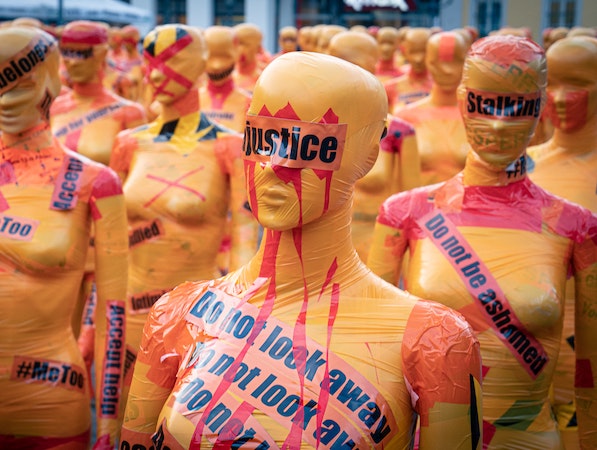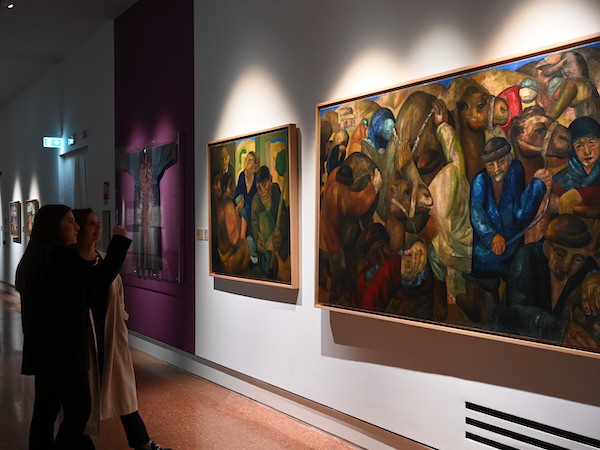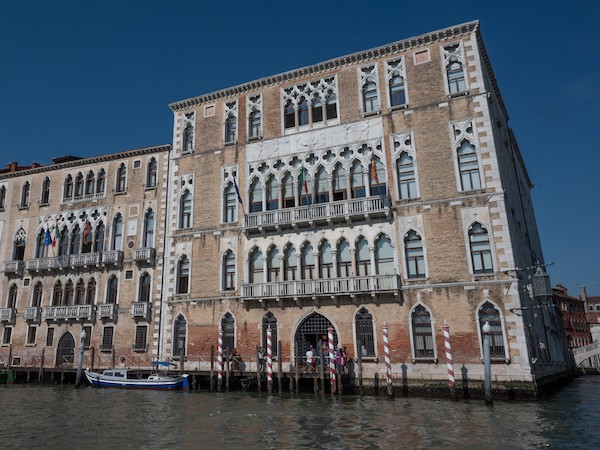Every hour, every day, across Europe, women are subjected to multiple forms of violence that cause physical and psychological wounds. This violence silences, kills, and erases women from the digital world. Hate speech against women has always existed, but today it spreads dangerously across the internet: with a few clicks, a person's life can be destroyed. News articles about domestic violence and femicide fill us with dismay — but are we really aware that this violence is rooted in culture, in our society, and that it is a type of discrimination based on gender?
Sara De Vido, Professor of International Law at Ca’ Foscari, is co-founder of the Women in International Law Network at the Manchester International Law Centre.
“Violence, especially domestic violence, is generally condemned, but we cannot say it is adequately punished,” says Professor De Vido. “Women can be reluctant to report the violence they have suffered to the authorities, because of the stigma attached to it, and because they fear they won’t be listened to or believed. When survivors do report violence, they are often victimised again because our culture is not sensitive enough to gender in the justice field.
European statistics on the extent of gender-based violence against women are insufficient, and focus only on some forms of violence. However, the data shows a clear and disturbing trend on a European level, which worsened during the COVID-19 pandemic.
Back in 2014, the European Union Agency for Fundamental Rights (FRA) published a report showing that one in three women in Europe experiences some form of physical and/or sexual violence by the age of 15. According to data recently provided by the European Institute for Gender Equality (EIGE), one in three women in Europe experiences some form of violence online by the age of 15.”
In Italy, according to the recent report by the Central Anticrime Directorate of Italian National Police, 89 women are victims of gender-based violence every day. The culprits are husbands or partners 34% of the time; 28% of time, they are ex partners.
The report: Criminalisation of gender-based violence against women in European States, including ICT-facilitated violence
Sara De Vido and Lorena Sosa (University of Utrecht) have published a study for the European Equality Law Network, commissioned by the European Commission, regarding criminal law on gender-based violence against women, including the so-called ICT-facilitated violence — violence that is facilitated by communication technology. 31 European countries were involved (the 27 European countries, plus Norway, Liechtenstein and Iceland). Download the full report here.
The report focuses on the forms of violence included in the Council of Europe Convention on preventing and combating violence against women ('Istanbul Convention'), which was proposed ten years ago and has since been adopted by 34 states, as well as online violence, which is not explicitly included in the Convention.
“In the last few years we have witnessed a certain activism in criminal law, but this activism is seldom supported by actual measures to enforce the law and adequately protect the women who are victims of violence,” Professor De Vido adds. “In European countries, the legal framework is only partly shared. When it comes to ICT-facilitated violence, which is not explicitly treated in the Istanbul Convention, we can say that the online sphere has not been adequately addressed in internal legislation.
Online hate speech, the sharing of private images without a person’s consent, and repeated messages which threaten unwanted behaviour, are only a few examples of how technology can be used for violent purposes. Romania is the only European country that has a specific definition of online violence against women — all the remaining countries have either adopted legislation which makes reference to some forms of violence that are facilitated by IT and communication technology, or have considered the online sphere as an aggravating factor for crimes that are often committed offline.
Some behaviour has recently been criminalised, such as the non-consensual sharing of photographs that are intimate, private and/or of a sexual nature— a crime which is commonly but incorrectly termed “revenge porn”. A woman’s initial consent to be photographed or filmed is irrelevant: if the resulting products are shared without her consent, this action must be punished, because it has consequences on the woman’s rights and autonomy.
The use or the sharing of photographs that are intimate, private and/or of a sexual nature is undeniably gendered. The studies and data available show that women and girls are disproportionately targeted: they are the main victims of digital sexualised violence, which is the online projection of offline violence. So far, only 11 states, including Italy, have criminalised the non-consensual dissemination of intimate, private, or sexual images.
However, measures to protect the victims of these crimes (such as having access to safe houses) are seldom contemplated, and data on gender-based violence does not take this aspect into account. We believe that criminalising this type of behaviour is essential, as well as promoting campaigns to raise awareness of the problem, because it encourages providers to act.”
Hate speech on the basis of gender or sex: a violation of human rights
The authors of the report also focussed on another online phenomenon: hate speech on the basis of gender/sex (‘sexist hate speech’). Online misogyny denigrates women’s bodies (body shaming), but also their professional competence and skills.
“This type of violence affects women and girls in every country of the world,” says Professor De Vido. “It affects politicians, journalists, academics, women who wish to share a thought or opinion online. In October 2021, in Italy, the Ddl Zan (a bill that would have made violence against LGBT people and disabled people, as well as misogyny, a hate crime, TN) was debated and eventually voted down. This shows the nearsightedness of a country that, unlike other European countries, refuses to see that hate speech on the basis of gender, gender identity, and sexual orientation, is a violation of fundamental human rights.
Sexist hate speech targets women because they are women. The law should regard this type of hate speech as a crime. But Italy refuses to do so. Our study has shown that the criminalisation of sexist hate speech is quite widespread in Europe (it is contemplated in 23 countries out of the 31 taken into account), whereas only 14 states have explicitly recognised sex and/or gender as the base of hate speech. This data should give us a lot of food for thought.”
Discussing gender-based violence and the measures to counter it
What are the obstacles to the fight against gender-based violence against women (GBVAW)? What prevents some states from foreseeing and adequately punishing certain criminal behaviour?
“On the one hand, gender-based stereotypes are persistant, and structural discrimination is difficult to dismantle,” Professor De Vido explains. “On the other hand there is political resistance. In the last few years there have been many “anti-gender” campaigns, which have questioned projects that aimed at promoting gender equality.
This also happens in Europe, even though gender equality is promoted on multiple levels, including at the heart of the European Union — as the resistance to the Istanbul Convention shows. The Convention happened ten years ago and seemed like an “easy” addition to the Inter-American Convention on the Prevention, Punishment, and Eradication of Violence against Women (1994) and the Protocol to the African Charter on Human and Peoples’ Rights on the Rights of Women in Africa (2003). After all, fighting violence against women has always been part of the political agenda. Nevertheless, the negotiation process for the Istanbul Convention was challenging. Moreover, in recent years, states such as Turkey have taken advantage of the internal political situation to denounce the Convention or to threaten to do so.
Gender equality is a shared value in Europe, and has been included in European Union treaties and in the legislation of the Council of Europe. Therefore, it is essential that we discuss gender-based violence against women and the measures to counter it every day — and not only after a woman is killed or on 25 November.”











